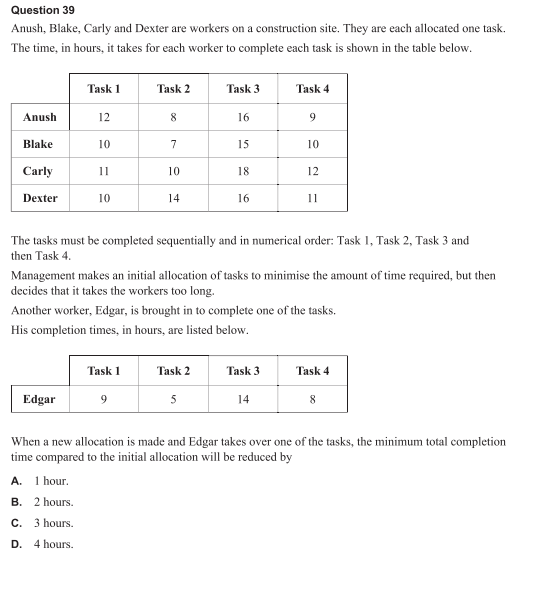When a new allocation is made and Edgar takes over one of the tasks, the minimum total completion time compared to the initial allocation will be reduced by how much?

Understand the Problem
The question provides task completion times for five workers and asks about the effect of reassigning one task to a new worker, Edgar, on the overall completion time. We need to calculate the total completion time for the initial allocation and the comparison with Edgar's times to find out the minimum total time reduction.
Answer
The minimum total completion time compared to the initial allocation will be reduced by $4$ hours.
Answer for screen readers
The minimum total completion time compared to the initial allocation will be reduced by $4$ hours.
Steps to Solve
- Calculate the total time for the original tasks Add the times of each worker assigned to the tasks in numerical order (Task 1, Task 2, Task 3, and Task 4).
[ \text{Total Time} = (\text{Anush for Task 1}) + (\text{Blake for Task 2}) + (\text{Carly for Task 3}) + (\text{Dexter for Task 4}) ]
Substituting the values:
[ \text{Total Time} = 12 + 7 + 18 + 11 = 48 \text{ hours} ]
- Calculate potential new times for each task if Edgar takes over Now calculate the total time if Edgar takes over each task one at a time:
- If Edgar takes Task 1:
[ \text{New Time} = (9 \text{ (Edgar for Task 1)}) + (7 \text{ (Blake for Task 2)}) + (18 \text{ (Carly for Task 3)}) + (11 \text{ (Dexter for Task 4)}) = 45 \text{ hours} ]
- If Edgar takes Task 2:
[ \text{New Time} = (12 \text{ (Anush for Task 1)}) + (5 \text{ (Edgar for Task 2)}) + (18 \text{ (Carly for Task 3)}) + (11 \text{ (Dexter for Task 4)}) = 46 \text{ hours} ]
- If Edgar takes Task 3:
[ \text{New Time} = (12 \text{ (Anush for Task 1)}) + (7 \text{ (Blake for Task 2)}) + (14 \text{ (Edgar for Task 3)}) + (11 \text{ (Dexter for Task 4)}) = 44 \text{ hours} ]
- If Edgar takes Task 4:
[ \text{New Time} = (12 \text{ (Anush for Task 1)}) + (7 \text{ (Blake for Task 2)}) + (18 \text{ (Carly for Task 3)}) + (8 \text{ (Edgar for Task 4)}) = 45 \text{ hours} ]
- Determine the minimum reduction in total time Now we compare the original completion time with the new times calculated above to find the smallest reduction:
- Original time = 48 hours
- New Times:
- Task 1: 45 hours (Reduction of 3 hours)
- Task 2: 46 hours (Reduction of 2 hours)
- Task 3: 44 hours (Reduction of 4 hours)
- Task 4: 45 hours (Reduction of 3 hours)
So the minimum reduction in total completion time is:
[ \text{Minimum Reduction} = 4 \text{ hours} ]
The minimum total completion time compared to the initial allocation will be reduced by $4$ hours.
More Information
The overall efficiency can significantly improve when the right worker is assigned to a task, as shown by the comparison of times. Edgar's faster completion on Task 3 led to the maximum reduction.
Tips
- Forgetting to sum the correct task times when calculating the original total time.
- Not accounting for the order in which the tasks are completed.
- Miscalculating the reductions by neglecting to compare all scenarios.
AI-generated content may contain errors. Please verify critical information